- Home
- Anne Schraff
Unbroken Page 8
Unbroken Read online
Page 8
“That’s wonderful, David,” Emilio Ibarra boomed with a big smile. “I got elected to this job so that I could help people.” The big man sighed. “And I try to do that. But most of the time I am caught in a web of taxes, fees, arguments in the council, irate citizens. When you do something like this from my office, David, you redeem me. You bring me to my core, for these are the things that really matter.”
David thanked the councilman and left his office. Outside, he left a voice mail for Ernesto. “Dude, you passing out those pictures of Bobby was pure genius. We never would have found him otherwise. Thanks, Ernie.”
Later, between classes, Ernesto got the message, smiled, and went looking for Clay Aguirre. “Hey, Aguirre,” he shouted. “I gotta tell you something, man.”
Clay turned. “Wasn’t the kid, huh?” he asked. “I thought it probably wasn’t, but it looked like him.”
“It was the right kid,” Ernesto answered. “David just texted me. They found the kid right where you said you saw him. They took him home to his mom. Thanks for the tip, man. Without it, the kid would still be out there. He’d be living in a dirty warehouse, maybe getting mugged or killed by some dopehead. You know what you did, Clay? You maybe saved the life of a fourteen-year-old boy.”
Clay Aguirre looked shocked. “Yeah . . . well,” he mumbled.
“Deal with it, man. You did something great,” Ernesto insisted. “Would you accept a fist bump from an old enemy?”
Clay shrugged again, and the boys fist-bumped.
“I still don’t like you, Sandoval,” Clay grumbled.
“Same here, homie,” Ernesto said, smiling and walking away.
CHAPTER EIGHT
While David and Livy were out of the office, Jeff Caudillo had held the fort. Now, with them back, he went out for a late lunch. Emilio Ibarra was at a meeting trying to decide how to use the extra money from the added sales tax. The revenue had to be doled out to the police, the fire department, and all the other agencies.
From time to time as he worked the computer, David glanced at Livy. He didn’t want to, but she had amazingly big gray eyes, flecked with silver and was very lovely. But he steeled himself against noticing that too much. Any relationship with her was totally out of the question. He struggled to keep a tight rein on his emotions.
Out of the blue, Livy commented, “I keep thinking about that poor little guy, Bobby. You wonder how these kids from troubled homes even survive. I mean, David, we’re so lucky. We come from good families who always nurtured us. Like we took it for granted that Mom and Dad loved us and would do the right thing.”
David ached to set her straight on his own background, but he kept quiet. Livy continued. “My own dad’s a wonderful man. I was Daddy’s little girl, and he couldn’t do enough for me. Mom was the same way. Mom was always right there for me and my brother. Mom didn’t even start her nursing career full time until we were both in school. Even then, she arranged her schedule so she’d be there every day. She’d welcome us home from school even if that meant working nights at the hospital. But kids like Bobby . . . His mother loves him, and she didn’t mean to scare him off. But he’s got a brutal father. What must that be like for a kid?”
David briefly closed his eyes. Terrible memories about foster care flooded back like a bloody tide. He shivered. Many children thrived with loving foster families. But David and Paul were not so lucky.
“You look so deep in thought, David,” Livy commented. “Seeing somebody like Bobby makes us appreciate what we have, doesn’t it?”
“Yeah,” David replied. He was glad when the phone rang.
Near the end of the day, Jeff Caudillo suggested that they all meet at the coffee shop downstairs before going home. “They got great coffee and awesome scones down there,” Jeff urged.
“I’m game,” Livy agreed immediately. “It’s been quite a day.”
“Okay,” David responded. But he still didn’t feel comfortable with his fellow staff members.
Only a little later, they sat in the coffee shop, sipping coffee and waiting for their scones. Jeff remarked, “You know, Mr. Ibarra drives me crazy sometimes. But he’s the most honest politician I’ve ever known, and I’ve worked with a few. I spent a year as an intern to a congressman in Washington, and, man, did my youthful idealism take a beating. The guy cheated on his wife and hit on the girl interns. He was so crooked that he joked about not being able to lie in bed straight. But Mr. Ibarra, he’s so honest he won’t even borrow paper clips to take home.”
“Yes,” Livy agreed, putting her coffee cup down. “Last month, some slick-looking guys came in trying to get a zone change. Someone wanted to put another bar on Polk Street, as if there aren’t enough there already. I know they offered him money. He literally threw them out of his office. When the councilman pounds his fist on the desk, it’s like an earthquake, and he sure did that day.”
The scones were delivered to their table, and Livy beamed. “Oh, I love these. A little cream and sugar and golden brown. I’ve tried to make them at home, but they never come out this good.”
David had never had a scone before. He didn’t even know what it was, but he liked his. It went great with the coffee.
Jeff turned to David with a half smile on his face. “You’re sort of an odd duck, David,” Jeff commented. “I haven’t figured you out yet, but I can tell you one thing. Mr. Ibarra really likes you. He’s a good guy to work for, and he appreciates all his staff. But he’s really high on you.”
“Mr. Ibarra told me that too,” Livy added, smiling. “He told me that when he hired you, David, he hit the jackpot.”
“Thanks,” David murmured. “I like working up there, and you guys are great to work with.”
“Except when I’m trying to get security to throw some lady out of the office?” Jeff asked, teasingly. “You were right on that, David, but Mrs. Padilla made me nervous.”
“You never know when somebody’s going to get violent,” Livy remarked, swallowing a bite of scone.
Finished with their scones and coffee, the three staff members headed home. In his truck on the freeway, David felt very good about how things were going. But he was still nervous. Nobody knew his background. Maybe if they did know, they would treat him differently. He knew his secret would eventually leak out. If they found out he was an ex-con, how would that change things? A lot of people could never forgive someone who’d been in prison.
When David got home, Paul was opening the box of hot pizza. “How’d it go, dude?” Paul asked.
“Good, real good,” David answered. The pizza looked and smelled so good. Even though he wasn’t hungry because of the scones, David decided to take a small slice.
“David, Carmen called me at work,” Paul reported. “Her father told her what you did today. Dude, you rescued a poor kid from who knows what. I’m tellin’ you, Carmen is about ready to put you in for canonization.” Paul grinned. “I’m proud of you, hermano, really, really proud.”
David stood there, pizza slice in hand, saying nothing. He couldn’t remember Paul ever being that proud of him. Maybe he was once, ages ago when they were both kids. David had flown off the high ramp on his skateboard and landed erect. But he couldn’t even remember that for sure.
“Thanks,” David responded.
Paul leaned back on the sofa with his slice of pizza and asked, “Remember the Johnsons?”
“Yeah, the black family,” David recalled. “I guess they were our foster parents when I was about thirteen and you were ten. It was one of only two times that we got put together in the same foster home. Man, I was happy about that. I remember that big old house—all messy—and I loved it. Mrs. Johnson was a lousy housekeeper. Man, she had four kids of her own besides us and another boy.”
David was gesturing with a pizza slice in his hand. “But could she cook!” he remarked. “Remember those sweet potato pies? They were good people, Paul. I remember havin’ this crazy hope. I kept thinkin’ they’d adopt us or something, and we coul
d stay there. Maybe they just didn’t know how to adopt someone. But I sure wanted to stay there.”
“Remember their big yard?” Paul recollected. “Overgrown weeds and rabbits. You really liked those rabbits.”
“Yeah, the bunnies were cute,” David replied. “The Johnson’s house was up against a canyon. There was a lotta wild-life—skunks, raccoons, opossum . . .”
“You know, I remember one thing,” Paul remarked. “When the coyotes showed up, no more bunnies.”
“Yeah,” David said sadly.
“You kept looking for the bunnies even when you knew what happened,” Paul went on. “And you cried. I was so embarrassed. My thirteen-year-old brother was cryin’ for the bunnies the coyotes got. I thought, ‘What is wrong with this dude?’ I didn’t get it at all. But now I guess I do.”
Paul looked directly at his brother. “You have a better heart than me, David. That’s why you went to so much trouble to get that kid home. I didn’t know Mom well, but I know she had a tender heart. I remember that. She was always gentle and kind, even when she was stoned. I must take after our father, the old diablo who stranded us all. But you take after Mom.”
“Your heart’s plenty good, Paul,” David assured him.
“By the way, dude,” Paul changed the subject. “I dropped Carmen off at her father’s office. When she didn’t come right down, I went up there. Hey, I saw a real hot chick, a blonde. She work there all the time?”
“Yeah, Livy Majors,” David replied. “She’s really nice. She helped me get Bobby Padilla home.”
“Do you like her?” Paul asked.
“Sure, she’s easy to work with,” David said.
“No—I mean,” Paul began.
“Man, don’t even go there,” David objected with a shudder. “She’s a fine girl. She comes from a nice family. I wouldn’t dare even think—”
“Dude, you’re a good man,” Paul said. “You made a mistake. You paid dearly for it. But you have a good heart and good character. You’re good enough for any chick, and she’d be lucky to get you. If you like her, ask her out.”
“No way,” David objected. “It gives me nightmares to think of her ever finding out about me.”
“Dude,” Paul declared, “there’s only one difference between you and a lot of other guys. You got caught, and they didn’t. You learned from your mistake, and you paid the price. If you don’t stop talking like that, man, I’ll knock you upside your head.” Paul dug into the box for another slice of pizza.
On Saturday morning, David was gassing up his truck at a station on Polk. Out of nowhere, a female voice shrieked, “Davy! Davy Morales!”
David turned to see Denise Valencia, his girlfriend before he went to prison. Old memories rushed into his mind. He had been in love with Denise, or at least he thought he’d been. She was his first serious relationship. She was pretty and fun, and she absolutely adored nice things. Among the many reasons David had for turning into a burglar was his desire to buy expensive gifts for Denise.
David looked at the girl. She hadn’t changed much. She was still cute in her too-tight jeans and low-cut blouse. “Hi, Denise,” he said.
“Oh, Davy! When did you get out?” she asked. “Somebody told me you were out. I didn’t believe them ’cause I thought you’d get in touch with me first thing. But I didn’t hear from you, so I thought you were still in the lockup. So how long you been out?”
“About a week or so,” David answered.
“Bummer!” Denise groaned. “And you didn’t call me, Davy. Hey, but you look great. Lotta guys getting out of prison look awful, but you’re as handsome as ever. Boy oh boy, Davy, is it ever good to see you. I thought you’d be in prison for another couple years. I thought maybe we’d never see you again.”
“I did everything right, and I got early parole,” David explained. “You look good too, Denise. How’ve you been doing?” He pulled the hose from the gas pump and closed the cap. He wasn’t sure how he felt about seeing Denise again. His feelings were very mixed.
“I’m a manicurist now,” Denise answered. “I’m doing okay, I guess. Boy, Davy, didn’t we have some good times, though? I thought of you a lot after you were gone.”
David remembered going on dates with Denise. Augie and Freddy would bring their chicks too. The six of them would usually go to hot night spots, drinking, partying. “I’ve thought of those days too,” David replied.
A look of sadness crossed Denise’s face. “Davy, I felt so bad when you got busted. It wasn’t fair that you took the fall like that. It just wasn’t fair.”
“I wouldn’t rat out Augie, Denise,” David stated. “He didn’t force me to get mixed up in that stuff. I was old enough to know better. I wanted nice stuff, and I didn’t make much money at that fried chicken house. I got greedy, and I paid for it. It was fair enough.”
“Still, it wasn’t right that he got off and you . . .,” Denise repeated herself, still looking sad. “I thought a lot about writing you or going to see you in prison, Davy. I really wanted to. A couple times I started to write, but . . . then I didn’t. I bet you thought I abandoned you.”
“We all do the best we can,” David remarked.
“Davy,” Denise told him, “I feel so bad you thought I abandoned you. Are you busy right now? Could we maybe go and get a frozen yogurt or something? And, you know . . . talk?”
“I gotta get home right now,” David responded. “I brought my laptop home to do some work. Maybe some other time.”
Denise took a pen and a slip of paper from her purse. She jotted something on the paper and handed it to David. “Here’s my cell phone number, Davy. Just call me anytime, and we can, you know, catch up. We had such good times.”
“Yeah,” David answered, taking the paper. “Hey, nice seeing you, Denise.” He climbed into the pickup and drove off. He turned once and waved to the girl, who stood there looking forlorn. She still looked hot. She’d always looked hot.
As he drove home, David wasn’t sure what he was feeling. He and Denise had some great times together. There was no denying that. David felt that, for a while, he loved her, and he thought she loved him.
David remembered the Christmas before he got busted. He’d bought Denise a pair of diamond solitaire earrings. He could still hear her screaming with joy as she put them on. David had never seen anyone so happy. Just seeing her like that made him happy too. The earrings cost over a thousand dollars. Denise hugged and kissed David over and over. It was the best gift she ever got, she told him. She didn’t ask David where he got the money for such an expensive gift. But she had to know it wasn’t from working at the fried chicken place.
Sometimes those days seemed like only yesterday. Other times, they seemed as though they all happened a million years ago. And they happened to someone else, not David. He and Augie would hit electronics stores about three times a week. For a while, they were making a lot of money.
David bought Denise a lot of nice things—clothing, jewelry—but he bought stuff for himself too. He went to good clothing stores and picked up expensive leather jackets. He got pretty much everything he’d always wanted. He remembered his teenaged brother’s reaction. Paul would stare at the stuff and demand to know where David got the money. David put Paul off by telling him he was winning almost every night at the casinos. The truth was David lost more money at the casinos than he ever made. That motivated him to burglarize even more stores.
David didn’t feel bitter about buying Denise all those nice gifts. That wouldn’t be fair, he thought. She didn’t ask him to become a criminal. They were both young, a little past twenty. They both drank and partied and lived as though there would never be a reckoning. David just got carried away by the easy money and lifestyle.
Then one night, when he was home with Paul, they were watching a baseball game on TV.
“Cops!” Paul had gasped.
The police were through the door in a second, their blinding lights in the boys’ faces. David would never forget the as
hen horror on Paul’s face. The cops were shouting over and over, “Warrant! Get your hands in the air!”
David didn’t resist arrest. He had no weapons. He never owned a gun in his life. He was devastated when the police officers put Paul on the floor too while they checked for guns in the house.
“He didn’t know what was going on,” David told the police. “My brother’s just a kid. He’s clean! He’s clean! He never knew what I was doing . . . I swear.”
Even now, David could feel his arms being jerked behind his back and the cuffing. It was the end of his life as a free man, the darkest moment of his life. He felt as if he were falling into a deep, dark pit and he would never get out. All of it was branded on David’s brain: the terror and the shame of that night, the trial, the look on Paul’s face as he sat in the courtroom and heard his brother sentenced to prison. No matter how long he lived, he would never forget that night.
But none of that was Denise’s fault. He never blamed her. Not once. And now he looked at her cell phone number on the slip of paper. He folded it and put it into his wallet.
CHAPTER NINE
Denise Valencia and David Morales never talked about his crimes. She knew David hung with Freddy and Augie, and they were always pulling capers. Denise just enjoyed the moment.
Denise came from a troubled background. She was a kid from a poor family. Her father had been busted for causing an accident while he was drunk. Someone was killed in the accident, and so her father was serving time. Her older brother was on drugs.
For that brief, almost fairy tale time, when she dated David, she had a good life. They traveled in style, ate at great restaurants, shopped at nice stores. It was like stepping into a bright new world that was exciting for both of them. Denise asked no questions.
When David was in prison, Denise never even sent him a card. He often wondered why. He thought about her a lot during that long, lonely time. He longed for any contact with the outside world. A small card on his birthday from Denise would have been wonderful. During the nights when he lay on his prison cot, he even fantasized that Denise might surprise him by showing up at visiting time. He thought that, when he got out of prison, they might get together again. He still cared for her then. But no letters, no card, no visits ever came. Denise told him she felt sad now because David thought she had abandoned him. But she had. And she never explained why.

 Unbroken
Unbroken Wildflower
Wildflower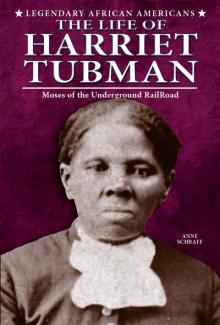 The Life of Harriet Tubman
The Life of Harriet Tubman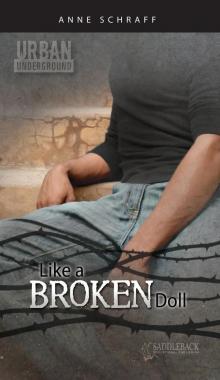 Like a Broken Doll
Like a Broken Doll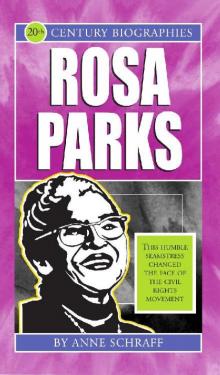 Rosa Parks
Rosa Parks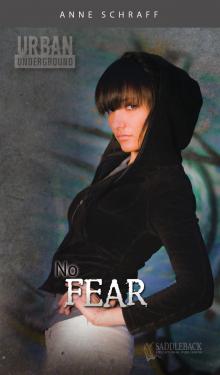 No Fear
No Fear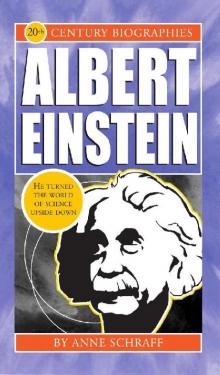 Albert Einstien
Albert Einstien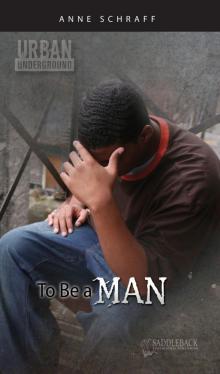 To Be a Man
To Be a Man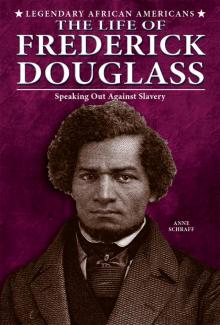 The Life of Frederick Douglass
The Life of Frederick Douglass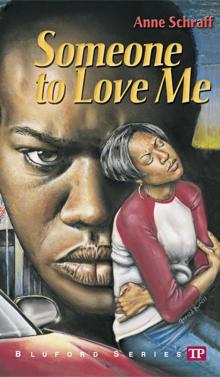 Someone to Love Me
Someone to Love Me A Matter of Trust
A Matter of Trust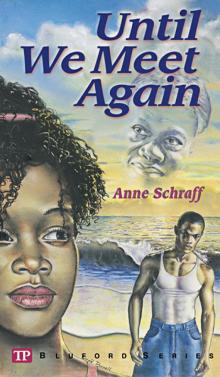 Until We Meet Again
Until We Meet Again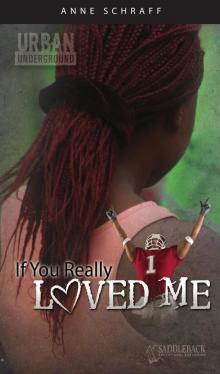 If You Really Loved Me
If You Really Loved Me